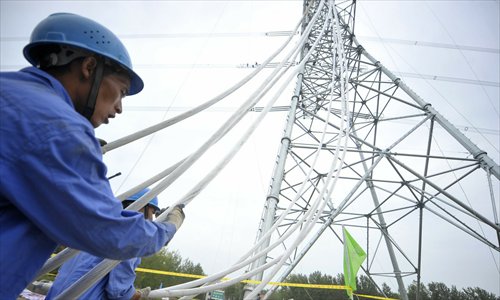NDRC defends credibility of GDP data
Doubts raised over 7% H1 growth rate

A man works on a power grid in Yangzhou, East China's Jiangsu Province. Photo: CFP
The National Development and Reform Commission (NDRC) on Wednesday defended the credibility of the country's 7 percent GDP growth rate in the first half of the year, and rejected doubts that have been expressed about the accuracy of the figure.
In a post published on its website Wednesday, the NDRC, China's top economic planner, said that doubts about the country's economic growth data were not based on "strict and sound research."
On Tuesday, one day ahead of his State visit to the US, President Xi Jinping said in an interview with the Wall Street Journal that the Chinese economy "is still operating within the proper range."
Xi said the 7 percent growth rate had been "hard-won considering the intricacy and changeable nature of the overall global economy," but he noted that China's economic growth rate is still one of the fastest in the world.
According to preliminary data released on July 15 by the National Bureau of Statistics (NBS), China's GDP rose 7 percent year-on-year in the first half of 2015.
The NBS said the data indicated "moderate but stable and sound momentum of development," and that China's economy remained on track to meet the government's full-year growth target of around 7 percent.
However, doubts about the growth data have since been expressed, with some media reports and experts questioning the accuracy of the figure.
A Bloomberg report on August 18 suggested that the Chinese economy was growing more slowly than the official data had indicated, citing a survey it conducted among 11 economists.
The survey indicated that the first half growth rate was 6.3 percent, rather than the official 7 percent, according to Bloomberg.
The NDRC's post on Wednesday dismissed such media reports and surveys as being "too arbitrary."
The NDRC also noted that electricity usage, volume of freight and other goods indexes can not determine whether the Chinese economy is growing more slowly, because the services sector and the pharmaceutical, electronic, telecommunications and high tech industries account for an increasing proportion of the Chinese economy.
Zhong Dajun, director of the Beijing Dajun Institute for Economic Observation, also said that measuring China's economic growth just by looking at energy consumption and other "old economic indexes" is not accurate.
"As China's economy is moving toward being more high-tech and energy-efficient, those indexes we used before can't draw a full picture of the economy anymore," Zhong told the Global Times Wednesday, adding that the official GDP data was "reasonable and accurate."
However, Zhong noted that for a country "as large as China, and with an economy as complex as China's, it's normal that economic statistics have a margin of error."
Xu Hongcai, an expert at the China Center for International Economic Exchanges, said it is true that energy consumption, exports and some other indexes are falling, but booming industries such as e-commerce and the services sector should not be overlooked.
"As China continues to optimize its economic structure, we need to look at it differently," Xu told the Global Times on Wednesday.
"We should also look at the new industries and take new technologies and innovations into account," Xu said.
A separate article also published Wednesday on the NDRC's website urged the international community to get used to the "new normal" of the Chinese economy and its slower economic growth rate.
The international community needs to recognize and adapt to the change, and not expect China's economy to always grow at a high speed, the article said. In the meantime, it said, spending is rising moderately, and China is still one of the world's fastest-growing economies and still a key engine for world economic growth.